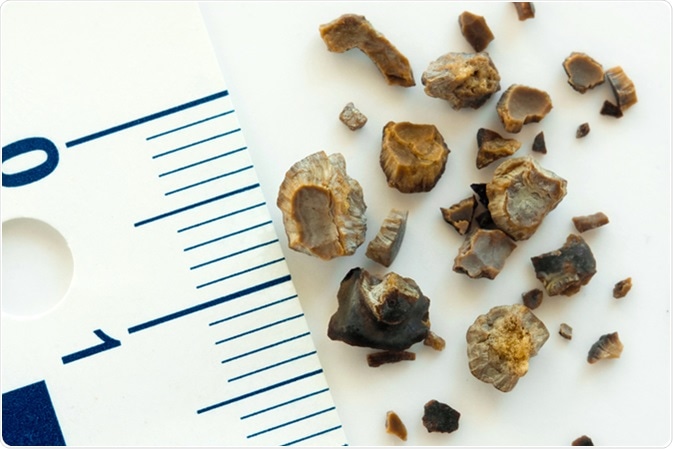For The Latest Medical News, Health News, Research News, COVID-19 News, Pharma News, Glaucoma News, Diabetes News, Herb News, Phytochemical News, Thailand Cannabis News, Cancer News, Doctor News, Thailand Hospital News, Oral Cancer News, Thailand Doctors
Studies have shown that by changing food and nutrients, as well as consuming a combination of different foods and nutrients, kidney stones can be prevented. Diet also constitutes our fluid requirements. Diet provides approximately 20% of fluid to the body. Vegetables and fruits, for example, as well as spinach and watermelon comprise about 90% water. Beverages, such as juices, milk, wine, beer, tea, and coffee, also have water in them.

The main chemical component of the human body is water, contributing up to 60% of body weight. When there is a deficiency of fluids such as water, the body will become dehydrated and affected individuals will feel tired. The fluid requirements for each of us may vary considerably, depending upon factors, such as intense exercise, environment, and health conditions. The Institute of Medicine has suggested that the adequate intake of fluid per day is approximately 3 liters for men and 2 liters for women.
To make the urine less acidic, in order to avoid kidney stones, adding citrate to drinking water is recommended. Lime juice and lemon are high citrate sources. Citrate prevents stone formation and also aids in the prevention of crystal binding so that the size of the stones will not increase.
In situations, such as marathon running, more fluid is lost by way of sweating. So intake of drinking water mixed with small quantities of sugar and electrolytes may help in preventing dehydration.
Obese individuals are at a higher risk of having kidney stones. It is important for them to stay hydrated as the chance of dehydration is more in people who are overweight. The risk of getting kidney stones may increase when extreme diet control is followed or when laxatives are consumed for losing weight. Maintaining good health through diet and exercise is important.
As calcium oxalate stones are formed when acidic levels are high in urine, consuming beverages and foods that help in lowering the acidity of the urine is beneficial (for example, intake of nutritional supplements, such as calcium citrate, potassium citrate and magnesium potassium citrate). When urine shows higher calcium levels, not more than 2 grams of sodium is advised for a typical day. All of these steps will help in the prevention of calcium oxalate stone formation. Avoiding higher protein quantities and having sufficient quantities of vitamin D is also advised.
Oxalates inhibit the body’s ability to absorb calcium, and, as a result, calcium is accumulated in the kidney and oxalate stones are formed. Foods such as beetroot, chocolates, celery, berries, asparagus, parsley, soy products, peanuts, almonds, cashew nuts, grains such as whole wheat, and oatmeal have oxalate.
In any case, reducing the intake of calcium is only done per physician advice, as calcium is very important for maintaining healthy teeth and bones. Moreover, studies do not show that reducing calcium intake affects the growth and formation of calcium stones.
To avoid formation of uric acid stones, fructose and protein intake can be reduced. The risk of kidney stone formation is as high as 38% when fructose consumption is increased. Also, restricting alcoholic beverages, especially beer, is recommended. As betaine and cranberry juice makes the urine acidic, avoid consuming them; however, alkalize urine with juices made of citrus fruits. Reducing the amount of fish, poultry, and meat products in the diet helps in reducing uric acid stone formation.
When purine is consumed in higher quantities, more uric acid is produced, leading to stone formation in the kidneys. Purine is available in large quantities in shellfish and red meat. Reducing a high purine diet and following a healthy diet is advisable.
When the urine is not sufficiently acidic, it aids in calcium phosphate stone formation, which is common among pregnant women. So intake of foods that may increase urine acidity is recommended.
When the urine is more acidic, cystine stones are formed; consume foods and beverages that reduce the acidity in the urine.
Struvite stones are linked with infections in the bladder. Staying hydrated, by drinking fluids and consuming vegetables, fruits, legumes, nuts, and grains, helps in reducing bladder infection. Consuming a diet that increases the acidity of the urine will help.
Studies have found that Vitamin B, such as riboflavin, thiamine, niacin, B12 and B6, do no affect kidney stones. B6 is said to increase oxalate in urine. Physician guidance is recommended to use Vitamin C, fish-liver oils, Vitamin D, or other mineral supplements that have calcium as it can increase the risk of stone formation in some individuals.
DASH diet can be followed to prevent kidney stones as it is designed in such a way that intake of sodium is reduced; a variety of nutrient-rich fruits is included in the diet. DASH foods allows systolic blood pressure to drop up to 14%, which reduces the health risk significantly.